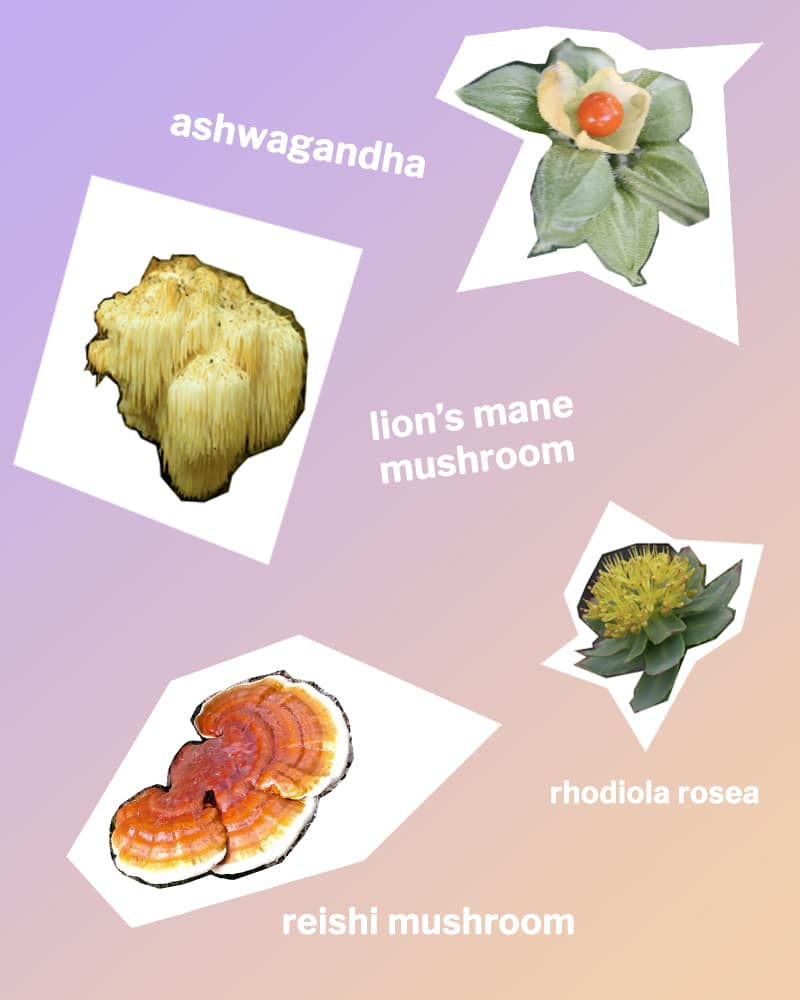
? Longread alert! ? This is an in-depth explainer on adaptogens! We use this article to answer the most common questions about adaptogens, such as “What are adaptogens?”, “What are adaptogen side effects?” “What do adaptogens do?” “How do adaptogens work?” and more.
Summary: The vast majority of supposed adaptogens have very little research backing them. There are a few that are well-supported, however. Which one you should take depends on your goal.
- Consult your doctor before taking adaptogens
- In general, adaptogens have mild but broad effects
- Adaptogenic effects supposedly happen over time—any adaptogen, when taken for immediate effects, is simply acting more as a straight-up stimulants or depressant
- Adaptogens may provide stress relief, increase your energy, improve your immune function, and decrease your cancer risk, among other benefits
- Adaptogens may have mild side effects, if any, though reactions between the adaptogens and prescription drugs can cause more severe side effects
- Adaptogens that have benefits well-supported by scientific research include ashwagandha, ginseng, rhodiola rosea, and reishi (or lingzhi mushroom)
What Are Adaptogens?
At this time, there is actually no one specific definition of the word adaptogen. That said, all definitions of the term contain some of the following ideas.
Adaptogens are herbal substances which may stabilize the body’s physiological processes, promote biological homeostasis (a state of dynamic equilibrium), and enhance a person’s resistance to both physical and mental stress.
This concept is distinct from the idea of a depressant or anti-anxiety substance, in that adaptogens are supposed to be selective. That is, they (supposedly) reduce stress only when needed, having a stronger anti-stress effect the more stress you’re experiencing. In some cases, adaptogens may increase physiological arousal—and by extension, temporarily increase stress levels—when needed.
Adaptogens supposedly reduce stress only when needed, having a stronger anti-stress effect the more stress you’re experiencing.
Some definitions of adaptogens also include the idea that they must be non-toxic, although “non-toxic” can be a misleading term. As we’ll discuss later, any substance can become toxic if the dose is high enough. But adaptogens are generally not dangerous as such. Finally, some definitions include the idea that an adaptogen must be non-specific in its action—that it must reduce stress broadly and act on many different body tissues, rather than having one narrow effect.
List Of Common Adaptogens
Common adaptogens include:
- ginseng (both panax and Siberian varities)
- eleuthero
- ashwagandha
- reishi mushrooms
- astralagus
- cordyceps
- goji berry
- licorice root
- jioagulan
- shilajit
- holy basil
- lion’s mane
- rhodiola rosea
- magnolia berry
- turmeric
What Does The Medical And Scientific Community Think About Adaptogens?

Adaptogens have historically been used in traditional herbal medicine, particularly in Russia, China and India. Modern research on them began in the Soviet Union in the 1940s, and most studies have come from Russia, China or Korea, and more recently Sweden and India.
In the Western scientific establishment, the term adaptogen is not generally accepted. This is due to a lack of compelling evidence that they actually help the body adapt to stress. While such effects also haven’t been disproven, and there is some evidence for them, the consensus is that more research is needed.
For the time being, most Western researchers believe that adaptogens have consistent, non-dynamic effects. That is, any given supplement will either raise or lower your energy level, rather than doing whichever you need at any given time. There is, however, little dispute that most adaptogens do something; the disagreement pertains specifically to what that “something” is.
How Do Adaptogens Work?
Different adaptogens have different mechanisms of action, so there’s no simple answer to this question. Many adaptogens, in fact, seem to have multiple or unclear mechanisms of action, not unlike CBD.
In addition, some adaptogens appear to have different effects at different dosages, or long-term effects that are distinct from their short-term effects.
In theory, adaptogens reduce a person’s level of baseline arousal, i.e. chronic stress. This in turn allows the body to conserve energy for when it’s needed. While no adaptogens have yet been shown to work this way, this is basically what meditation and other stress management techniques achieve. So it is, as least, theoretically possible.
Some adaptogens appear to have different effects at different dosages, or long-term effects that are distinct from their short-term effects.
What has been demonstrated is that some adaptogens act primarily as stimulants—boosting one’s energy level and mental performance—while also reducing anxiety. In other words, there’s some evidence that adaptogens can provide the best aspects of both stimulants and depressants.
Likewise, some adaptogens act primarily as depressants, yet have been shown to have some stimulant-like effects over the long term. Ashwagandha, for instance, is mainly an anxiolytic. And yet, 8 weeks of aswaghanda supplementation can improve power output during exercise. Whether this is due to “adaptogenesis” or merely improved sleep and recovery is open to interpretation.
You May Only See The Effect Of Adaptogens Over The Long Term
Another theory is that adaptogens directly affect the body’s stress response. Normally, the body’s response to stress occurs in several phases, including an adaptation phase in which the body makes itself more resilient to future stressors. One proposed mechanism of action is that adaptogens can strengthen or prolong this adaptation phase, making the body better at adapting to stress over time.
If true, this would necessarily require long-term, rather than acute, dosing to see the full benefit of adaptogens. Note that this is an enhancement of non-specific stress resistance. In other words, the effects extend to stress in general, not just the specific type of stress you experienced.
In fact, most studies on adaptogens seem to agree that most of their effects only manifest over the long term. Subjects usually have to take an adaptogen for weeks in order to experience simultaneous increases in energy/power and decreases in anxiety/stress.
Finally, there is some evidence that adaptogens, and particularly ginseng, can reduce the risk of cancer. Since stress in general raises the risk of cancer, this is likely secondary to the anti-stress effects of adaptogens.
What Are The Effects Of Adaptogens?

In general, adaptogens have mild but broad effects.
Ginseng, for instance, mildly improves calmness and working memory, subjective well-being, erectile function, blood sugar management, and at least half a dozen other parameters—but only mildly.
Some adaptogens, however, fall clearly on one side of the stimulant/depressant spectrum. In these cases, they may have moderately powerful stimulant effects but only mild depressant effects, or vice versa.
Ashwagandha is a good example of a primarily depressant adaptogen. It is moderately powerful at reducing stress and cortisol levels, and may help you sleep. However, over the long term, it also mildly enhances sprinting capacity, increases motivation, and speeds up one’s metabolism via increased thyroid hormone secretion.
Again, it has to be emphasized that these effects manifest over the long term. Some adaptogen supplements are sold for their supposed acute benefits; these supplements are questionable at best, particularly those ginseng supplements that are sold in one to four dose quantities at convenience stores.
That said, some adaptogens do have immediate benefits. However, any acute benefit isn’t truly adaptogenic, since adaptogenesis, by definition, happens over time. Instead, these supplements, when taken for their immediate effects, are acting more as straight-up stimulants or depressants.
Are Adaptogens Safe? What Are Adaptogen Side Effects?
In line with their generally mild effects, adaptogens have very mild side effect profiles. Furthermore, what side effects they do have are usually of the “nuisance” rather than “dangerous” variety.
Ginseng, for instance, can cause headaches, nausea, and diarrhea. Ashwagandha and reishi mushrooms can cause drowsiness, although that is essentially an extension of their main, anxiolytic/sedative effects.
Side effects are dose-dependent and usually avoidable by using the minimum effective dose. Digestive side effects are also dependent on the form in which a supplement is taken, which will be discussed later.
The story does change, however, when adaptogens are combined with prescription drugs. In that case, synergistic reactions between the two can cause more severe side effects. Ginseng, for instance, can lead to dangerous liver toxicity when combined with the anti-cancer drug imatinib.
There’s no way to list every possible drug interaction here; just know that in principle, any supplement which has significant effects is also likely to have interactions with some prescription drugs. If you’re taking one or more prescription medications, do your research and talk to your doctor before taking adaptogens.
Which Adaptogens Should You Take?
The vast majority of supposed adaptogens have very little research backing them. There are a few that are well-supported, however. Which one you should take depends on your goal.
| Adaptogen | Benefits | Dosage |
| Ashwagandha | Acute and chronic stress relief | 300 mg twice a day |
| Rhodiola rosea | More energy | 300 mg once a day |
| Reishi mushrooms | Improves immune function, decreases cancer risk | 1,800 mg three times a day |
| Panax ginseng | Reduces inflammation, decreases cancer risk | 200 to 400 mg a day |
For both acute and chronic stress relief, ashwagandha seems to be far and away the most effective. 300 mg, twice a day, with food, is a reliable dose for long-term stress relief. For short-term stress relief, you can just take an extra 300 mg as needed.
The vast majority of supposed adaptogens have very little research backing them. There are a few that are well-supported, however. Which one you should take depends on your goal.
If your goal is to have more energy, rhodiola rosea has been shown to moderately reduce stress-induced fatigue and improve congition, as well as increasing subjective well-being. It acts as a stimulant, sort of like a non-jittery caffeine, and can slightly reduce stress, whereas caffeine increases it.
The optimal dose for rhodiola appears to be 100 to 600 mg, taken in the mornings, with 300 mg being a good middle ground that should work for most people. Since it is a stimulant, it should not be taken in the evenings, as it can impair proper sleep function.
For general health, and in particular, for improving immune function and preventing cancer, ginseng and reishi mushrooms both seem to be highly effective, and are likely to have synergistic effects if used in conjunction.
Reishi, or lingzhi mushroom, has been shown to enhance immunity, including the production of anti-cancer “killer” cells, and also it may boost “good” HDL cholesterol. The most popular dose is 1,800 mg, three times a day.
Panax ginseng reduces systemic inflammation as well as overall cancer risk, and also improves subjective well-being and overall quality of life. The standard dosage is 200 to 400 mg a day; people who take 400 mg may wish to divide the dosage, morning and evening.

How To Take Adaptogens
Adaptogens are always taken via the oral route, usually in capsules but sometimes in powdered form, whole foods, or tea. There is very little evidence on the relative bioavailability of these different forms of ingestion, so it largely comes down to personal taste.
For those adaptogens which are available in food form, such as reishi mushrooms, ginseng and holy basil, this route has the advantage of being the most “natural” and least processed, which is pretty much universally a good thing when it comes to food. The downside here is that there is no standardization of the dosage.
A slightly better option may be teas made from adaptogenic herbs, such as the Four Sigmatic reishi mushroom and lion’s mane teas, or the many varieties of ginseng tea currently on the market. These teas are still minimally processed, but the dosage is clearly measured.
In most cases however, your only options will be powders or capsules, or sometimes only capsules. Powders will be cheaper, but the downsides are that they often don’t taste good, and may not dissolve properly in water. Read reviews to find out if this is the case before buying them. Powders also don’t blend more than one ingredient like capsules often do; this may or may not be what you want.
Capsules are more expensive, but they have the advantage of offering controlled dosages, not being messy, and being easy to store and take. Additionally, people who are prone to gastrointestinal symptoms usually find those symptoms to be less severe with capsules as opposed to powders, because capsules are designed to stay intact until the supplement is in the intestine, minimizing stomach upset.
Editor’s Note About The Research In This Article
This article has been heavily researched and fact checked, using peer-reviewed papers from reputable academic and trade journals. Though each source we used is hyperlinked in-line, if you’d like a list of sources we used for this piece, please email us at hello@the-unwinder.com. Also please reach out if you see any problems, errors, or misinterpretations of the data in this article.